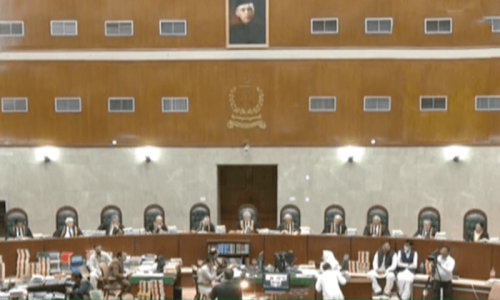ISLAMABAD: The federal government has, in the wake of top judiciary’s verdict upholding the Practice and Procedure Act 2023, decided to challenge the Supreme Court’s Sept 15 ruling in which it had declared as illegal the amended National Accountability Ordinance (NAO).
Talking to Dawn, Attorney General for Pakistan (AGP) Mansoor Usman Awan said the appeal is likely to be moved early next week.
Permission may also be sought from the apex court to furnish additional documents in support of the contention the government intends to highlight.
“The effect of the short order [announced on Oct 11] is that all judgements of the Supreme Court rendered under Article 184(3) after the day this law deemed to have come into effect are appealable including the judgement on amendments in the NAB Ordinance,” the AGP stated.
Accordingly, he explained, the federal government will file an appeal against the Sept 15 judgement.
AGP Awan says challenge may be filed early next week
The appeal becomes necessary since the full court’s Oct 11 decision in the practice and procedure case had rejected, by a 10-5 majority, all the challenges to the law while sustaining it as constitutional.
However, by a majority of nine to six, the short order had also explained that Section 5(1) of the act, which deals with granting the right of appeal prospectively, was in accordance with the Constitution.
The judgement rejecting the NAB amendments came on Sept 15 whereas the Supreme Court (Practice and Procedure) Act 2023 had become an act of parliament on April 21, thus allowing room for filing the appeals.
Moreover, all the cases under Article 184(3) of the Constitution were to be heard by a bench constituted by a committee consisting of three senior most judges under Section 3 of the Supreme Court (Practice and Procedure) Act, 2023, said an application moved by Makhdoom Ali Khan, counsel for the previous PDM government.
The lawyer had also highlighted that the cases involving interpretation of constitutional provisions were to be heard by the bench comprising no less than five judges as per Section 4 of the act.
But the decision against the NAB amendments had been rendered by a three-judge bench headed by then chief justice of Pakistan Umar Ata Bandial.
During the hearing of the NAB amendment case, Justice Syed Mansoor Ali Shah in a note on Aug 18 had also highlighted the possibility of the NAB challenge case becoming coram non judice and a nullity in the eye of law, if the constitutionality of Sections 3 and 4 was upheld by some other bench.
Subsequently, Makhdoom Ali Khan through his application had requested the SC to adjourn the case until a final decision on the practice and procedures act was announced, or alternatively full court be constituted to hear the NAB amendment case.
The application had also stated that the challenge by PTI Chairman Imran Khan to the NAB amendments before the apex court was an attempt to bypass the legislative process provided in the Constitution.
If such practice is allowed, all political parties having no majority in parliament to pass or resist passing of a law will undermine the legislative process by directly invoking the jurisdiction of the SC under Article 184(3) of the Constitution, he had pointed out.
The court, however, had not decided on this application.
Published in Dawn, October 13th, 2023















































Dear visitor, the comments section is undergoing an overhaul and will return soon.